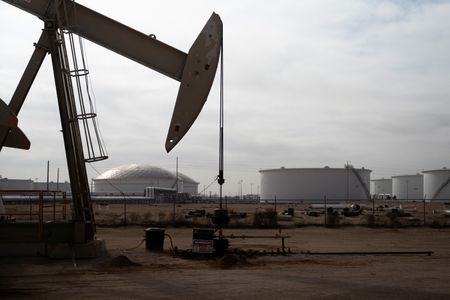By Laila Kearney and Jeslyn Lerh
SINGAPORE (Reuters) -Oil prices rose for a second day on Wednesday as an industry report showed U.S. crude inventories declined last week, adding to a sense in the market of tightening supplies.
Brent futures rose 19 cents, or 0.3%, to $67.82 a barrel by 0400 GMT. U.S. West Texas Intermediate crude futures gained 21 cents, or 0.3%, to $63.62.
Both benchmarks climbed by more than $1 a barrel on Tuesday as a deal to resume exports from Iraq’s Kurdistan stalled, halting pipeline shipments of oil from the region to Turkey despite hopes of a deal to end the deadlock, as two key producers asked for debt repayment guarantees.
The agreement between Iraq’s federal and Kurdish regional governments and oil companies would resume exports of about 230,000 barrels per day of oil. Pipeline flows have been stopped since March 2023.
“Prices are expected to remain supported but range-bound in the near term,” said Emril Jamil, a senior analyst for oil at the LSEG.
Ongoing supply disruptions from Russia support prices but further gains are capped by uncertainty over U.S. Federal Reserve interest rate decisions, Jamil added.
American Petroleum Institute figures showed U.S. crude and gasoline stocks fell, while distillate stocks rose last week, according to market sources citing the API data.
The data showed crude stocks declined by 3.82 million barrels in the week ended September 19, the sources said, while gasoline inventories fell by 1.05 million barrels and distillate inventories rose by 518,000 barrels.
Official U.S. government energy data is due on Wednesday, which is expected to show a gain in both crude oil and gasoline stockpiles and a likely decline in distillates.
There are other signs of tightening supply, with Reuters reporting U.S. major Chevron will only be able to export about half of the 240,000 barrels per day of the crude it produces with partners in Venezuela.
In July, the company received an authorisation to operate in the sanctioned country, but the new rules will mean less of the heavy, high-sulphur crude produced in Venezuela will reach the U.S.
(Reporting by Laila Kearney and Jeslyn Lerh; Editing by Christian Schmollinger and Jamie Freed)











